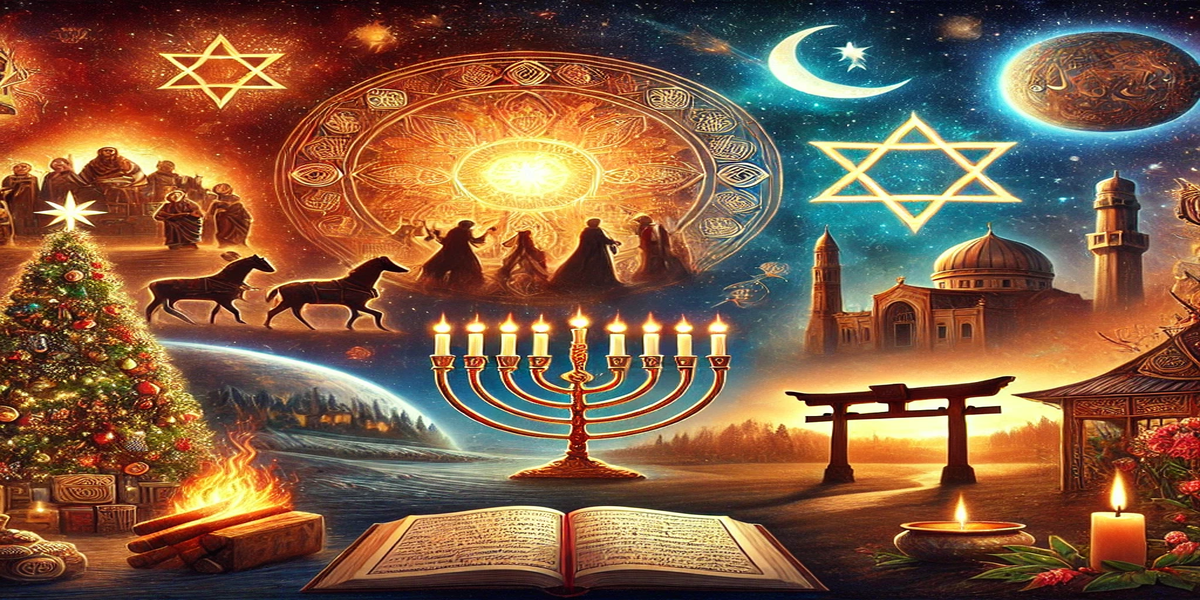How Different Religions Celebrate December 25th: A Cosmic Connection

Need Guidance On Your Problems?
Consult With The Best Online Astrologers
December 25th holds a unique place in human culture. While most of us associate it with Christmas and the birth of Jesus Christ, this day has a rich tapestry of meanings that extend across various religions and traditions. Let’s explore how different faiths and spiritual practices honor December 25th and uncover the universal threads that connect us all.
1. Christianity: The Birth of Jesus Christ
For Christians, December 25th is celebrated as the birth of Jesus Christ, the savior and central figure of Christianity. Churches are adorned with lights, nativity scenes, and festive decorations. Midnight Mass is a cherished tradition where congregations gather to reflect on themes of hope, peace, and salvation. While the Bible does not specify Jesus' exact birth date, early Christians chose December 25th to coincide with existing pagan festivals, symbolizing the coming of light into the world.
2. Paganism: Winter Solstice and Yuletide
Before the rise of Christianity, December 25th aligned closely with pagan celebrations of the Winter Solstice. These festivities, such as the Roman Saturnalia and the Norse Yule, honored the return of the Sun after the darkest days of winter. Feasts, gift-giving, and lighting candles were common practices. Some of these traditions, like decorating evergreen trees, have been seamlessly woven into modern Christmas celebrations.
3. Hinduism: Celebrating Light and Devotion
While December 25th is not a significant date in Hinduism, many Hindus honor the day by participating in global celebrations, especially in regions where Christmas is widely observed. In India, for example, Christmas is celebrated as "Bada Din" (Big Day), with interfaith communities exchanging gifts and sweets. Additionally, some Hindus associate the date with the spirit of devotion and the universal message of love and compassion.
4. Islam: Reflection and Community
Though December 25th is not an Islamic holiday, many Muslims around the world respect the day as it celebrates Prophet Isa (Jesus), a revered figure in Islam. Jesus is acknowledged as a prophet and messenger in the Quran. Muslim families in multicultural societies often join in the festive spirit by participating in interfaith gatherings and sharing meals with their Christian friends and neighbors.
5. Judaism: Hanukkah Overlaps
While Hanukkah and December 25th do not always coincide, the Festival of Lights sometimes overlaps with Christmas. When it does, Jewish families may celebrate Hanukkah by lighting the menorah, playing dreidel, and enjoying traditional foods. In multicultural settings, Jewish and Christian families often share in each other’s celebrations, fostering a spirit of unity and understanding.
6. Buddhism: A Time for Peace
Buddhism does not traditionally observe December 25th, but many Buddhists embrace the spirit of peace and goodwill associated with the day. Temples and meditation centers often hold special events focusing on compassion, mindfulness, and universal harmony. In predominantly Buddhist countries like Japan, Christmas has been adopted as a secular holiday, celebrated with festive lights and communal gatherings.
7. Modern Spiritual Practices: A Day of Light
For those who follow modern spiritual paths or astrology, December 25th is often seen as a day to honor the alignment of cosmic energies. The date’s proximity to the Winter Solstice makes it a powerful time for reflection, gratitude, and setting intentions for the coming year. Celebrating the return of solar and spiritual light is a theme that resonates across traditions.
Finding Unity in Diversity
The myriad ways in which December 25th is celebrated highlight the diverse expressions of human spirituality. Whether it’s the birth of a savior, the return of the Sun, or a time for peace and connection, this date serves as a reminder of our shared humanity. By honoring the traditions of others, we create space for deeper understanding and unity.
So, this December 25th, take a moment to look up at the stars. Reflect on the stories, myths, and meanings that bind us together. After all, the cosmos is a testament to the beauty of diversity and the power of connection.



